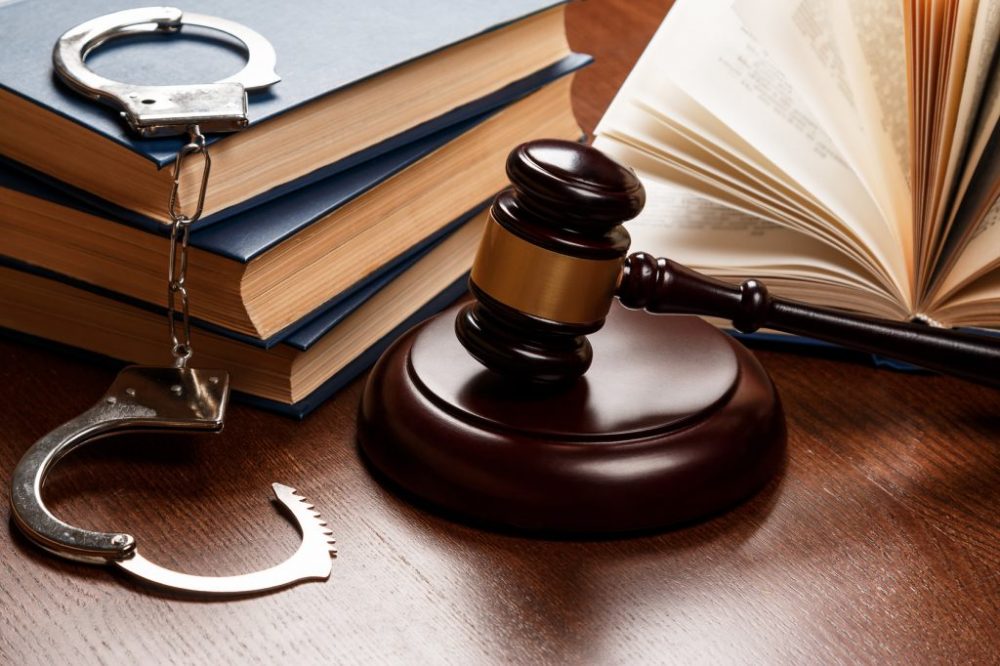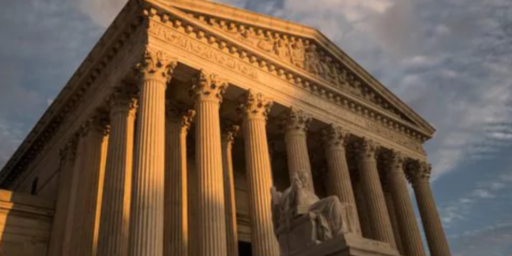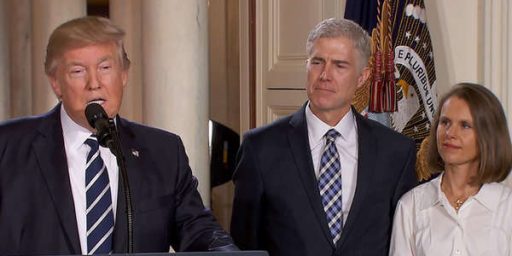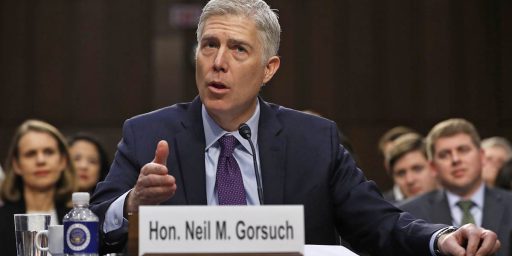More McGirt Musings
What has the Supreme Court wrought?

The Supreme Court’s 5-4 ruling that eastern Oklahoma remains an Indian reservation is getting far less attention than the two decisions issued the same day on President Trump’s tax returns. Even though it has no impact on me whatsoever, I continue to think it’s the more interesting case.
My go-to law blogs, SCOTUSBlog, Lawfare, and Volokh Conspiracy have only one post between them on the case. And Ronald Mann’s post at SCOTUSBlog is mostly a summary of Justice Gorsuch’s majority opinion.
I find the ruling less bizarre as I’ve delved deeper into the history. Gorsuch’s analysis is beautifully written and persuasive in terms of text and precedent. Chief Justice Roberts’ dissent is clumsier, seeking to justify an outcome. Yet, I think Roberts got it right.
Gorsuch’s starting point is unassailable and inspiring: “On the far end of the Trail of Tears was a promise. . . . Because Congress has not said otherwise, we hold the government to its word.” Yet, I agree with Roberts that Congress has indeed said otherwise, repeatedly, since making that promise.
Gorsuch does a fine job of citing precedents that allow Congress to disestablish Indian reservations but that require them to do so explicitly. And arguing that, as a technical matter, none of the thousand cuts—most notably establishing a new state containing the reservation or forcing the tribes to sell off most of the land to individual, mostly white, citizens—are sufficient.
He also dismisses what I consider the most powerful of the dissenters’ arguments—a century-plus of practice indicates that Oklahoma and the tribes understood that the land in question was no longer tribal—with a crisp rebuke: “Unlawful acts, performed long enough and with sufficient vigor, are never enough to amend the law.”
While that’s a beautiful sentiment, the fact of the matter is that neither the state of Oklahoma nor the tribes had any reason to think—certainly, by the time McGirk was arrested and tried—that Oklahoma was acting unlawfully.
And we’re not talking about fundamental civil liberties here but land ownership, which indeed operates under different principles. At some point, a structure built on property belonging to someone else creates ownership of said property if not contested.
To me, the ruling shows the limitations of a textualist approach. Roberts is much harder to pin down. Is he simply, as he claims, a minimalist? A purposivist? A strategic maximizer?
Regardless, his instinct, as demonstrated in this dissent, is one I share: judges should defer to the elected branches absent egregious offense. And, ultimately, especially at the highest levels, need to this about the consequences of their ruling beyond the case at hand.
The United States’ treatment of the tribes in question is among the greatest stains on our record, rivaled only by slavery. Gorsuch’s recognition of that is commendable. But he does very little to rectify it here, but at great cost.
While I’m certain those who study the record more broadly and closely than I do can cite counter-examples, Roberts has generally sought to avoid broad rulings that create, rather than resolve, uncertainty in the law. Absent extremely compelling rights issues on the other side, I think that’s the right instinct.*
In insisting on a technical interpretation of the law, Gorsuch has created an inordinate number of problems. The state and the tribes are already working many of them out and Congress is sure to get involved. But the decision will certainly invite all manner of new lawsuits seeking to settle related questions.
Yet it’s not obvious what it is the Muscogee (Creek) Indians and the rest of the tribes in eastern Oklahoma gained. While the majority have ruled the land is “an Indian reservation,” the way that it is practically an Indian reservation is not at all clear to me.
Granting that the modern state of reservations is not an area I’ve explored much, my conception of them is something akin to a military base. That is, there’s a defined parcel of land inside of which different rules apply. The state (or sometimes states) in which they reside have no jurisdiction (unless some agreement has been reached on discrete issues) inside but those who work on base are subject to state laws once outside.
That doesn’t seem to be what we have here. Most of their land has long since been sold off. They’ve seemingly gained dual authority over criminal prosecution of tribal members with the federal government—which, incidentally, neither are currently situated to handle, having operated for a century with the understanding that Oklahoma was doing that.
But, even there, how does it work? Are there going to be Muscogee tribal police cars patrolling the streets, looking to enforce crimes committed by tribal members? And how would they even know who’s a tribal member? Racial profiling? (Oh, sorry, sir. You’re a Cherokee. Or a Mexican. You’re free to go.)
This may or may not have significant implications for civil law; I’ve seen conflicting opinions on that with little analysis. But it certainly applies to criminal law and now a tenth of the people living in eastern Oklahoma are suddenly operating under a different set of laws than the rest. I have no expertise on the tribal codes but Federal law is certainly silent on many matters that are typically delegated to states and localities. Moreover, in instances where there is overlap, Federal law tends to be harsher than state law, which means the ruling could have the perverse effect that Indian citizens are punished more severely for the same crimes as a white man in the same geographic area.
One persuasive analysis debunks the notion put forth by the state of Oklahoma (and cited by the dissenters) that hundreds of Indians will suddenly go free. But, this, too, strikes me as perverse.
A federal law passed, coincidentally in response to the bombing of the federal building in Oklahoma City, “places a one-year time limit after a conviction is finalized for petitioning for federal habeas relief.” The courts have been exceedingly stingy in granting exceptions to this rule. And, while Oklahoma has no such rule in its state courts, its high court has already rejected similar appeals, arguing that they should have been advanced on the first appeal.
While this provides an outcome I like—convicted felons not getting freed on a technicality having nothing to do with their rights being violated—it seems wildly unjust. If the US Supreme Court has ruled, to the surprise of the state of Oklahoma, the Five Tribes, and the Chief Justice of the Supreme Court that 111 years of practice was illegal, surely that should mean something.
The bottom line here is that, to the extent to tribes have won something for once, I’m happy for them. But, at the outset, it looks like a thin majority of the Supreme Court has created a mess without any substantial offset in justice.
______________________
*Which is not at all to say I always agree with his decisions. I thought, for example, his deeming the ObamaCare mandate a “tax” despite the insistence of those who passed it that it was not was too cute by half. For my tastes, he’s too deferential to law enforcement and willing to dismiss claims of injustice by criminal defendants. But I share his general vision of the role of the judiciary vis-a-vis the elected branches as well as that of the Supreme Court vis-a-vis the judicial system.





Time for the Lakota Sioux to return to court. They already have a federal court judgement that the Black Hills were taken in violation of a treaty still in force today, and have never accepted the moneys the federal government was ordered to pay them for that illegal taking (currently somewhere north of a billion dollars with interest and penalties), asserting that the federal government should simply return title to the land.
@Michael Cain: Gorsuch certainly opened the door for that. But he’s also said that Congress has near-plenary power to override these treaties. The question is whether they’ll do so.
One of ODB’s many nicknames was Dirt McGirt.
My favorite is Knifey McStab.
He had a kid who goes by Young Dirty Bastard which is teh awesomest.
Wu Tang Clan is for the children!
@James Joyner:
I appreciate that you are actively reviewing and re-evaluating both the decision and the underlying reasoning.
Your first take was reflexive.
IANAL, but your first take seemed like “this is not a decision I wanted therefore it is bad and bizarre”. Sometimes it is best to sit on the first take.
NAL, but it seems that ruling was on text and precedent and was a direct prod to congress to address it swiftly. Basically, the proponents have a valid legal claim because the law is the law and the text is the text.
You claim to approach the law from that avenue. Have done so recently. Repeatedly.
This approach is essentially “if I steal your car and sell it to someone else, it eventually becomes ok if you wait too long to complain about it”
Truthfully, this ruling is a pale approximation of justice. Justice would be reverting title to the land that was basically stolen from them, but obviously that isn’t going to happen. In practical terms, the ruling changes very little beyond expanding the area in which Native Americans aren’t subject to OK state courts, and all five of these nations already engage in broad cooperation with state and local entities with respect to both law enforcement and social services. If anything really changes, I suspect it will be the degree to which OK is able to these nations as a source of funding, which it shouldn’t have been doing in the first place. All things considered, I’m not sure what all the fuss is about.
I have a new appreciation of the lyric:
The wind comes sweepin’ down the plain
@Michael Cain:
Agreed. I admit to being partial to these folks, who’ve kept plugging away seeking remedy for the small injustices they’re able to rectify despite knowing they’ll never be made whole for the mother of all injustices. They’re inspiring.
Examined through the lens of the nation and state legal apparatus that we know, you are absolutely correct IMHO. But in the last couple of years I’ve read (and youtubed) an excess of horror stories by Dr Timothy Snyder. Anyone who has not read ‘Bloodlands’ has (again IMHO) an immense blind spot hiding the potential for what happens when the darkest beasts crawl out of the human psych. He reminds us that some 14 million people died amazingly cruel deaths for the simple reason that they did not have passports. The Ukrainian peasants who were slaughtered in hundreds of thousands in the ’30s could have managed to survive if they’d had ‘internal passports’ that allowed them to travel to cities where residents received ration cards for imported food. Alas, to the bands of urban workers who were released to search for the food the peasants were supposedly hoarding they were transformed into an enemy who had no rights.
The Jews of the Czech Sudetenland found themselves without documentation, without a nation to which they belonged. No longer Czechs, not citizens of the Reich, they were essentially wiped out.
The comparison to the American ‘Reconstruction’ is so obvious that I won’t belabor the point. And reading about the ‘Ghost Dancers’ or the Sand Hill Massacres (where the women of the Cheyenne were scalped ‘in a bad way’ and the U.S. Army cavalrymen wore the trophies as hatbands) makes it plain that It Can Happen Here because it DID.
No reason to mention the present administration and it’s promotion of ideologues such as Stephen Miller or Ken Cuccinelli.
It seems that Mr McGirt had the RIGHT to face justice BY HIS OWN PEOPLE. He has what amounts to a ‘passport’ that Miller or ‘Cuch’ cannot revoke.
I say good for the Supremes.
James, expanding on @de stijl‘s comment…
You are a “law and order” guy. Your default position, always, is that the law must be obeyed, be it good law or bad law, just or unjust, efficient or wasteful. It’s up to Congress to change bad laws, but in the meantime it’s the law, and personal preferences or scruples are irrelevant. We get that.
So it is fascinating to see a rare occasion when even you relent, and admit that there are higher authorities than The Law, and that pretending that a law does not exist would be the greater good. It seems odd (to say the least) that, having passed on many recent opportunities to approve of flouting the law when gross injustice was being done, or when separation of church and state was being weakened, or when the downtrodden erupted in understandable frustration and anger, you choose this cause as beyond toleration of the letter of the law.
@HarvardLaw92:
The affected federal court districts have asserted that they are neither funded nor staffed to handle — at least prosecute, possibly investigate — the additional load of violent crime cases.
@JohnMcC:
Like it when folks get revved up. Heartening.
@de stijl: @DrDaveT: My argument is simply that there is exceedingly good evidence that Congress intended to make the government of Oklahoma sovereign over its land mass when it created it as a state in 1909 and now 111 years of precedent for said sovereignty being in effect. Undoing that and creating substantial chaos with little in the way of offsetting benefit seems immodest.
@HarvardLaw92: This ruling would have made much more sense—and been much more meaningful—in 1920.
@James Joyner:
So how long do I have to wait after stealing your car before it becomes mine?
@Michael Cain:
I’m legitimately not sure what flood of cases they expect to receive. This is basically applicable only to still imprisoned Native Americans convicted by the state of OK for a very small list of major crimes delineated in the MCA which took place on tribal lands. I can’t imagine that there is an enormous population of those. The ones who should be concerned / who are facing a much larger caseload are the tribal courts, and they don’t seem to be worried.
@James Joyner:
How would this be handled if it were reversed — for instance if the reservation had land for a century that it turned out didn’t belong to it? Would it get to keep it because of the time lapse, or would it have to return it. I’m not being snarky, I am not a lawyer and honestly have no sense of what is normal here.
And what if it was private property — say my family somehow ended up with land that it had no right to, kept it for a century, and then proof that the property still belonged to someone else appeared. People talk of squatter’s rights, but I always assumed it was just an expression. But from what you say, it legally exists.
Totally aside from politics, how do these situations normally play out in court?
@de stijl: Dr Snyder’s books ‘got my motor running’ big time! And I don’t mind very much being a crank.
@Northerner:
Interesting thing here is that they aren’t regaining title to the stolen land. They’re just regaining sovereignty. The theft remains unaddressed, and likely always will.
@HarvardLaw92: The injustice was grave and, obviously, started well before the creation of Oklahoma. But if I’m standing the history according to Gorsuch, Congress had every legal right to force them to sell the land (which they did) and to strip their sovereignty (which they neglected to do explicitly but sure whittled sway at repeatedly). So, while there was lots of theft in a moral sense there was none in a legal sense.
Or am I missing your point?
@JohnMcC:
Too often we share our take without revealing or sharing the bedrock principles behind them.
I believe in and act on inclusion and justice.
Will always acknowledge when people are getting true about their core beliefs.
@James Joyner:
You’re missing the point. Our history with these folks has been, from day one, a consistent series of promises made but bretrayals delivered. Congress had the right to sell the land because it just decided one day to give itself that right, and a complicit Supreme Court went along with the scheme. Now, they’ve finally succeeded in forcing one small promise to be honored via a court that finally decided to do its job and enforce the law as written. Let them have this. They’re overdue for some small measure of justice, whatever the cost.
Consider your argument: “yah, it was illegal, but so much time has passed that they should just suck it up and deal. It’ll cause too much chaos to try to deal with it now”.
To which I’d reply: it is never too late to do the right thing. Plessy v. Ferguson was a stain on our history, but it took almost 70 years for it to be overturned, and doing so created a hell of a lot of chaos. It still deserved to be done, and I suspect if anybody had said “segregation has been how it is for a long time, and nobody complained, so why bring it up after all this time”, you’d have set the building on fire.
These folks, much like African-Americans in Brown, sought out justice and the law was on their side. It was also the right thing to do. Let them have the justice they’ve finally claimed for themselves.
It is never to late to do the right thing.
@HarvardLaw92: I’m with you morally but I think the Court gave the tribes back essentially nothing while potentially wreaking substantial havoc.
You know the law better than I do, obviously, but there are plenty of instances where failure to contest a claim long enough obviates it. The examples that spring to mind are adverse possession of property and failure to defend trademarks and copyrights. And that happens a lot faster than the case here.
Brown’s reversal of Plessy strikes me as very different. Yes, a long-standing precedent. But it was clearly a horrendous distortion of the 14th Amendment. And, unlike the case here, the Court was able to massively shift the scales in the direction of right. Blacks didn’t win a technical, largely Pyrrhic victory but were restored to their proper relationship with the Constitution.
@James Joyner:
No argument. As I noted, true justice would require compensation or restoration, at the option of the dispossessed, for what can only be regarded as having been a series of 5th Amendment takings without just compensation. One exercised through chicanery on a truly massive scale. It’s the fraud to end all frauds. In a just world, we’d be seeing rulings like United States v. Sioux Nation of Indians pursued and won by every single tribal entity we bamboozled and defrauded.
That would be the actual chaos you’re worried about, but it would be justifiable. The very pyrrhic nature of this victory is even more reason to accept it as some small measure of what they’re entitled to. We get to acknowledge a tiny little bit of right and it doesn’t really even inconvenience anybody.